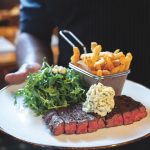Showing support after the diagnosis
Vail, CO, Colorado

ALL |
For Mary Anne Metternick, the most emotionally trying part of her fight against breast cancer was the diagnosis.
“My generation thinks of cancer as totally, completely deadly,” the 65-year-old Wolcott resident said. “It’s not anymore, but that’s where we come from.”
As she grappled with the shock of the news, Metternick found solace in an outpouring of support from friends and family members.
Metternick said her daughter flew in from New Zealand to stay with her.
“We did a little crying together, a little hugging, that kind of thing,” she said.

Support Local Journalism
And as family members flocked to her side, friends also appeared in droves. The hiking group she belongs to, the Dauntless Dames, brought dinners to her home while she was undergoing treatments.
With the support of loved ones, Metternick has survived two lumpectomies, a double masectomy and chemotherapy since her diagnosis May 16.
Her story is all too familiar. Cancer has drastically altered the lives of many valley residents and left their loved ones grasping for the right words to say.
Knowing how to reach out to cancer patients is tough because everyone reacts differently, retired oncologist and valley resident Marc Slatkoff said.
“We all have our own set of coping mechanisms,” he said. “I strongly believe that what people typically do in the cancer experience is they mostly fall back on the coping mechanisms that they have used their entire lives in times of difficulty.”
Keeping in mind that everyone is different, here are a few words of advice on how to support a loved one after the diagnosis.
Abandonment is a top fear for many cancer patients, Slatkoff said.
“You can abandon a person physically by being so afraid of the situation, you sever ties, but you can also abandon the person emotionally by not being able to really listen and really communicate,” he said.
That’s why it’s so important to simply be there, particularly during chemotherapy or radiation treatments.
Allan Goldberg knows how comforting it can be to have a friend in the doctors’ office. He’s a two-time cancer survivor and executive director of First Descents, an Avon-based organization that provides outdoor adventures for cancer survivors.
“It’s always great to have somebody with you on your first couple appointments so you have a second set of ears, to make sure you heard the same things the doctor was saying and that you got the same impressions,” Goldberg said.
Don’t extend a vague invitation for support. That’s one thing Eagle resident Jennifer Boggs learned from her mother’s battle with breast cancer.
“Instead of just saying, ‘Call me if you need anything,’ just do something because people tend to not call, even if they need the help,” she said.
Small gestures can have a big impact on those who are too sick to keep up with daily chores. Boggs said her mother benefited from having a housekeeper visit her home.
Likewise, cancer survivors suggest that friends and family offer to cook meals, pick up the mail, shovel snow and even offer rides to treatments.
Just give your loved one a heads up before stopping by, Boggs suggested.
“Don’t just show up at the house. Call first and say, ‘I’m going to stop by. When they’re going through cancer treatments, they’re not always feeling well and keeping themselves together. Give them some time to get dressed instead of being in their bathrobe, if that’s what they want to do.”
A fine line exists between being sensitive and dodging the cancer issue.
“I think the most important thing not to do is to ignore the person because you don’t know what to say or you’re afraid of showing emotion,” Boggs said.
Experts say honesty is the best approach in dealing with cancer patients.
“Don’t treat them with kid gloves,” said Slatkoff, who serves as medical director of First Descents. “Don’t ignore them. On the other end of the spectrum, don’t baby them. Just be yourself and open and honest.”
Goldberg, who survived muscle tissue cancer and a tumor in his soft palate, said he detested pity from friends.
“The worst thing to hear is, ‘Oh that must be terrible. I know exactly how you feel.'” he said. “The best was, ‘Hey man, I’m you’re friend and I’m here if you need me.'”
Kristin Kenney Williams, a board member with the Vail Breast Cancer Awareness Group, agrees sugar coating the situation can be hurtful.
“Having known several people who have gone through breast cancer or listened to some of our guest speakers, the number one thing I’ve heard from them that they hate to hear is when someone comes up to them and says ‘Oh, you look so good’ while they’re going through the treatments.”
Instead, acknowledge that “it’s a horrible thing that they’re going through and it flat out sucks,” she said.
Aspen-, Frisco-based U.S. Men’s National Rafting Team prepares for Rafting U.S. Open
Its founding members formed the team in the Roaring Fork Valley in 2015, and it has since grown to six members across the Western Slope and Front Range.










